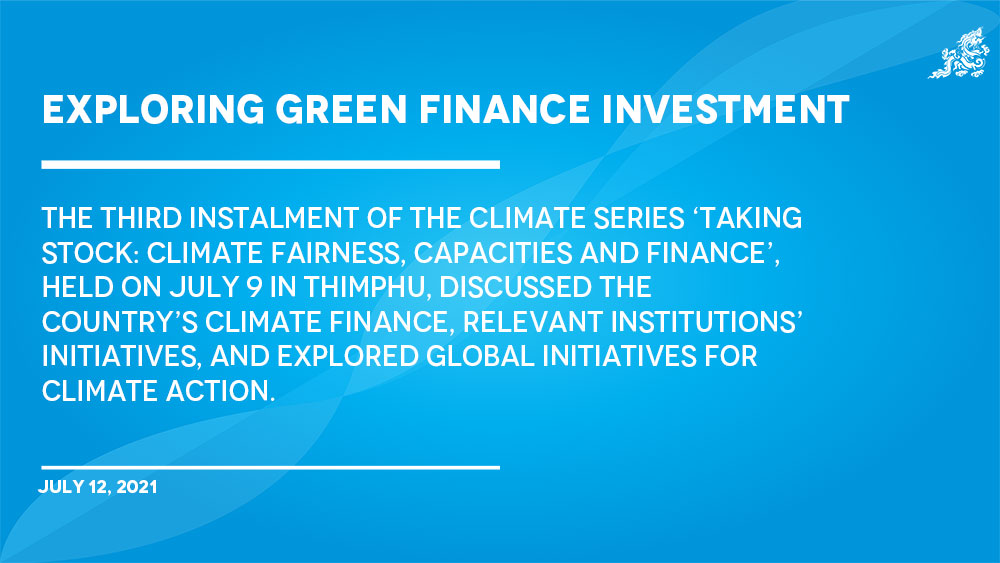Chhimi Dema
The third instalment of the climate series ‘Taking Stock: Climate Fairness, Capacities and Finance’, held on July 9 in Thimphu, discussed the country’s climate finance, relevant institutions’ initiatives, and explored global initiatives for climate action.
Experts representing various stakeholders presented legal frameworks under Bhutan’s carbon neutral commitment, green finance, and transformation actions and opportunities.
Consultant for environment and climate change, Thinley Namgyel, said that the country was vulnerable to climate change being in the mountains with a fragile ecosystem.
“As a landlocked and least developed country (LDC), we have limits on our resources and ability to respond to climate change,” he said, adding that in terms of vulnerability and adaptive capacity, the country was at the wrong end of the spectrum exposing to high climate risk.
He said that economic growth has a parallel growth with emissions that could threaten the carbon-neutral status within a few decades if the country proceeded with business as usual.
The emission projection is that within 2030, some sectors like transportation and industries could triple the emission, he said. “We have to start acting now and start making bold, transformative actions.”
The second session of the talk highlighted green finance, financial investments flowing into green initiatives and climate action.
Sonam Rinzin, leading the team on green finance from the Royal Monetary Authority (RMA), introduced the Green Finance Roadmap.
Sonam Rinzin said that RMA had ventured into green finance because finance drives the economic transformation of any country whereby business, job creation, and new opportunities are aligned to the mechanism of finance.
He said that green finance aspired to make the financial system of Bhutan more robust and resilient to external vulnerabilities in the wake of Covid-19 and to channel lending towards products and services that can deliver both investable returns and environmentally positive outcomes.
He added that green finance aspires to prioritise and mobilise additional green investments over business-as-usual investment and accelerate the financial sector’s contribution towards transitioning to a low carbon economy by leveraging on modern technology and innovations.
Bhutan for Life (BLF) Fund Secretariat’s executive director, Pema Wangda (PhD), spoke on the potential internal green financing source such as the payment of ecosystem services like revenue from hydropower, revenue from tourism and mining sector, and green tax.
He said that as the country graduate from the list of LDCs to middle-income countries, the government would need internal funding to support and manage the environment.
In the third session ‘Transformation actions and opportunities’, individuals from various fields shared their experiences and challenges on climate change and its impact.
The five-part virtual series will continue till October this year.
Next month, the series will be on ‘Youth Matters: Voices and Action in Climate Change’.
The instalment is part of the climate series ‘Raising Climate Ambition: Voices from Bhutan’ that was launched in May.
The climate series is organised by the National Environment Commission, UNDP, Bhutan Foundation, Royal University of Bhutan, WWF, and Bhutan Ecological Society.
Edited by Jigme Wangchuk


